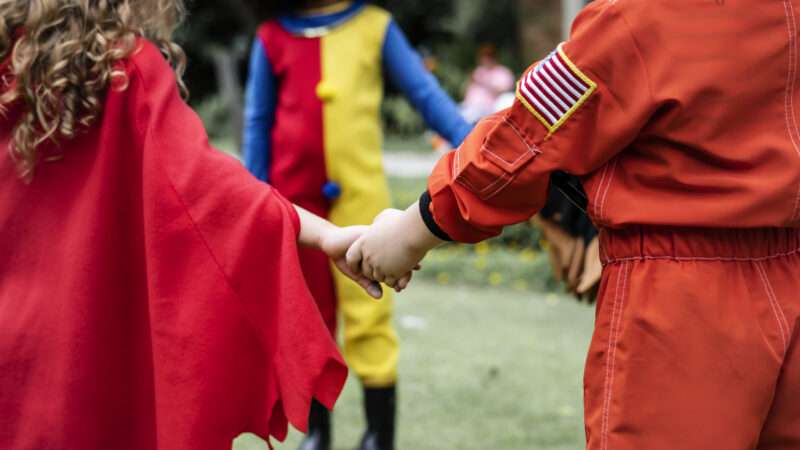
A Pennsylvania school district is canceling a popular Halloween parade. Why? Apparently, an outdoor Halloween celebration is unacceptably dangerous and unacceptably exclusive.
Lower Merion, A school district outside Philadelphia announced to parents last week that it would be canceling a popular Halloween parade in all six of its local elementary schools. The district justified the decision by invoking safety fears and concerns over the possible exclusion of children who do not celebrate Halloween. The decision is a clear example of what happens when safety concerns run afoul of reasoning. While the parades have consistently been a fun event for local schoolchildren, overblown and illogical concerns about “stranger danger”—and emotional distress to children who choose not to participate—have led officials to unnecessarily quash a beloved tradition.
Justifying the parades’ cancelation, officials noted the lack of security at the parades, arguing that, because the event is outside, schools cannot individually screen each adult that comes to the parade—thus opening up the possibility that a malicious stranger will attend. “Just the thought of having an entire school population of young children in a field surrounded by adults that we couldn’t possibly screen was worrisome,” Amy Buckman, director of the school district’s school and community relations told The Philadelphia Inquirer. She further compared the parades to a shooting incident at a nearby high school that left one 14-year-old dead, “we all saw what happened outside of a football game at Roxborough High School just a couple of weeks ago,” Buckman told ABC6, a Philadelphia local news station.
Officials also argued that canceling the parades was necessary to include children whose families do not celebrate Halloween, as kids who opt out of the parade have to sit in the library while it takes place. “Our district prides itself on providing a sense of belonging to every student. And we have numerous students who for religious or cultural reasons do not celebrate Halloween,” Buckman told the Inquirer. She added that some “kids would just be sitting in the library … and that does not help create a sense of belonging for children.”
Further, Buckman also noted that parents might be the ones to feel left out—citing that not all families are able to attend the parade. “There are some families for whom that’s really a hardship,” she told the Inquirer. “They don’t have the type of jobs or they don’t have the privilege of staying at home where you can just take a morning off without having a serious economic impact on your family.” Thus, according to Buckman, if not every child—and their parents—can attend the parade, it’s better if no one can.
Thankfully, many parents seem not to be buying the district’s justification to cancel the tradition.
“I feel like it’s just crossing the line and where does it end?” Linda Joseph, a local parent, told ABC6. “So, next people are going to be offended by pumpkins? So we’re going to take away pumpkins or jack-o-lanterns or pumpkin carving?”
“We seem to be taking the view of inclusivity as going down to the least common denominator, rather than trying to celebrate all cultures, all religions, all views for our kids,” local parent Dominique Izbicki told the Inquirer. “We’ve done other celebrations in the past, like Chinese New Year or Diwali. And certainly not every kid aligns with those … We’re very lucky to live in such a diverse area. Let’s embrace that.”
The district’s concern over safety also received pushback. “If this is a concern, then why do we have football games every weekend open to the public when we don’t screen people coming in?” Nicolosi added. “What is the difference between a parade and a football game?” Another parent noted the slippery slope of canceling events for ‘safety’ reasons. “There’s danger in every possible venue in every possible way. So what are you going to do? Cancel everything? I don’t know,” parent Rachel Gutman, told ABC6.
Just about anything taught or celebrated in schools have the opportunity to offend some parents, from library books, to yoga in P.E., to class birthday parties where parents bring sugary, allergen-laden treats. The solution is not to stop the fun and deny everyone because a few can’t join in. Instead, the solution is to embrace pluralism and show children that it’s perfectly fine if not everyone celebrates the same holidays or eats the same food as they do.
As for fears of malicious strangers at a local Halloween parade, Reason‘s Lenore Skenazy points out that a child is more likely to die from being hit by a meteor than from a stranger abduction. She writes that “these kids-are-in-danger-anytime-they’re-outside warnings come at a social cost. Amped-up fears of stranger danger are at least part of the reason only 11 percent of kids walk to school anymore. They’re part of the reason kids play outside on their own only an average of four to seven minutes per day.”
Canceling a Halloween parade won’t make kids any safer—nor is it the answer to fostering inclusion in a pluralistic society. Depriving kids of a beloved Halloween tradition simply makes childhood life a little blander, a little more constrained, and a little less colorful than it was before. Lower Merion school district officials have given in to overblown, unjustified fears of stranger danger, and of the physiological impact of freely opting out of a school activity. The Halloween parade might be canceled, but a truly spooky lack of perspective from school officials remains.
The post A School District Cancels A Beloved Halloween Parade Over Stranger-Danger Nonsense appeared first on Reason.com.
from Latest https://ift.tt/Gv82sUP
via IFTTT